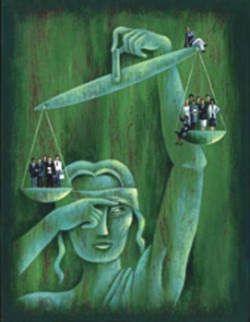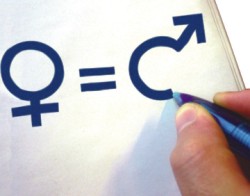Perceptions
The Lost Female Voice
Golam Sarwar Chowdhury
“Censor the body and you censor breath and speech at the same time. Write Yourself. Your body must be heard.”
--Helene Cixous
 What Helene Cixous, the radical French Feminist, boldly asserts in “The Laugh of the Medusa” is essentially a part of a philosophical movement that critiques metaphysics as being essentially a male narrative where the woman has no substantial presence. Even as we commemorate the international women's day, the 21st century western woman forcefully points out her lack or emptiness that philosophy has traditionally disseminated with very little exception. What Helene Cixous, the radical French Feminist, boldly asserts in “The Laugh of the Medusa” is essentially a part of a philosophical movement that critiques metaphysics as being essentially a male narrative where the woman has no substantial presence. Even as we commemorate the international women's day, the 21st century western woman forcefully points out her lack or emptiness that philosophy has traditionally disseminated with very little exception.
Over two thousand years, the female has remained absent, or at best precariously marginal, in the rich male rhetoric that has pretended to correctly answer all ontological and metaphysical questions. Cixous' radical feminism is shocking and subversive as it demands a new kind of writing, distinct from male discourse, in which sexuality intertwines with communication. This writing, stemming from the body, would help woman to overturn the grand narratives in western culture and enable her to attain what Cixous calls, 'Jouissance”, a pleasure that combines the erotic, the mystical and the political.
Helene Cixous' agenda goes beyond the philosophical and embraces the political along with the works of a whole bunch of radical feminists who strongly argue for inclusion of the female voice in western discourse. People interested in how women have been robbed of their power by patriarchal societies might be aware of the scholarship of Professor Cixous and others like Julia Kristeva in the continent, and Mary Daly and other feminists in the US who are waging a relentless counter struggle against male dominance in philosophy. As this movement continues in academia, western society still remains shockingly patriarchal at a level where the common female, employed or not, goes on combating male dominance and oppression in many forms.
The female still remains, an object at best in the Industrialised West in both sides of the Atlantic. Discrimination at work, in a variety of ways; fewer opportunities in education and marginalisation in high political, academic and corporate positions are some of the more obvious images that float around the world. Physical abuse and rape continue to haunt women in most European countries and the USA. In 1996, the number of women inmates in prisons, in the USA, far outnumbered men, and among these incarcerated women, the majority was black.
In western patriarchy, whatever 'success' women have attained is because of the patriarchal wish to place a few women, whose pattern of thinking is similar to men, so that the world can be given proof of equal opportunities for all. Condaliza Rice, with her intellectual background, could only function within a parameter strictly defined by patriarchy. Apparently, Professor Rice acted as a female but her thoughts reflected the desire of patriarchy. Similarly, Mrs Hilary Clinton, working for a liberal administration, has little to offer by herself because like Rice, she too has to work within the limits of a fixed patriarchal agenda that will not allow using her creative thoughts and original ideas.
If this is the plight of women in the industrialised and 'democratic' West, how could we define what is happening with females in Asia, Africa and Latin America? In Bangladesh, with a female prime minister at the helm of affairs, supported by a number female ministers, what is happening to acid victims, underpaid female workers in the apparels industry, the under aged domestic help denied of education and all other basic human rights, not to speak of female rights, the woman who gets murdered by her husband for dowry, women who are denied an equal share of their parents' property because the grand narrative prescribes so.
In neighbouring India, the female baby still gets buried in a strong patriarchal culture that ironically draws inspiration from grand narratives that deify women. The polymorphous Indian culture seems to uphold the image of woman in many ways because the scriptures have empowered the goddesses. In reality however, society treats women not any differently from other countries in Europe and Asia. The reason is that modern India is a patriarchy where the female, like those in the west, can only function according to the needs of patriarchy.
 In Pakistan, honour killing remains the most barbaric way of treating women, not to speak of the Pakistani Taliban's desire to stop female education and employment of all kind. Religious-based political parties in Bangladesh and Pakistan have in clear terms stated that the woman's safe haven is the home, and when outside and uncovered, she arouses lust in men and is a source of sin. Should Pakistan lose its war with the Talibans, one trembles in fear thinking about the fate of the Pakistani woman in the years to come. In Pakistan, honour killing remains the most barbaric way of treating women, not to speak of the Pakistani Taliban's desire to stop female education and employment of all kind. Religious-based political parties in Bangladesh and Pakistan have in clear terms stated that the woman's safe haven is the home, and when outside and uncovered, she arouses lust in men and is a source of sin. Should Pakistan lose its war with the Talibans, one trembles in fear thinking about the fate of the Pakistani woman in the years to come.
As Cixous, Kristeva and others continue their struggle, from academia, against patriarchal discourse, in our part of the world, both men and women need to be sensitive to the female as being equal to the male. It is primarily the responsibility of men to treat women as equals not only in terms of the law but also by understanding that for thousands of years the male has dominated the female and has erased her from history. She now exists only in the margins robbed of her power to connect and unite and make this world a better place for living.
Golam Sarwar Chowdhury is Professor of English at the University of Liberal Arts Bangladesh (ULAB)
Copyright
(R) thedailystar.net 2010 |
